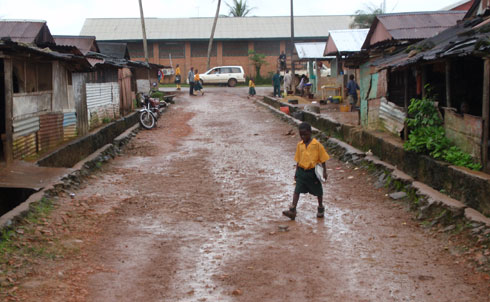
For over 85 years, Firestone’s massive rubber plantation in western Liberia has operated as a state within a state, not only serving as the second largest employer in a country with widespread unemployment, but also controlling the schools, housing, water and markets which operate on its land.
During the past five months, the Firestone Agricultural Workers Union of Liberia (FAWUL) has been struggling to reach a new and more equitable labor agreement with the multinational corporation. The union finally won a new contract on June 28. It’s the second contract FAWUL has won since Liberia settled into an exhausted peace in 2003. In interviews this past fall in Liberia, workers and activists recited a list of grievances, some of which go back decades: literally backbreaking quotas, meager wages, dismissal without cause, and atrocious housing, to say nothing of Firestone’s ongoing pollution. These days the company has roughly 5,000 tappers on the payroll, which makes it the second largest employer in a country with massive unemployment.
Credit: Nicholas Jahr
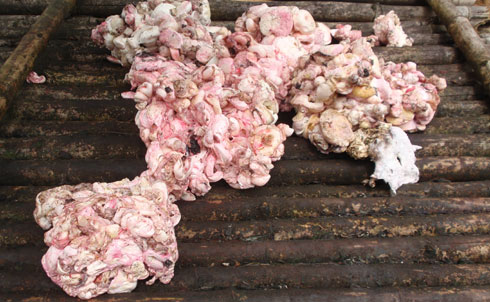
Tapping rubber trees is methodical, delicate work, and Firestone’s tappers extract latex from hundreds of trees a day. Eventually they pour the congealed latex into buckets and haul the 150-pound load about a mile over their shoulders to a collection station where it is consolidated and loaded on to trucks. As the company doesn’t provide safety gear, most tappers work without it—no boots to protect them from snakebite, no goggles to shield their eyes from splinters or chemicals—but it’s the fact that the rubber is literally transported on the backs of the workers that has long outraged FAWUL officer Austin Natee. Perhaps the most important gain in the new contract is the promise of a mechanized transport system to carry the latex to weigh stations.
Credit: Nicholas Jahr
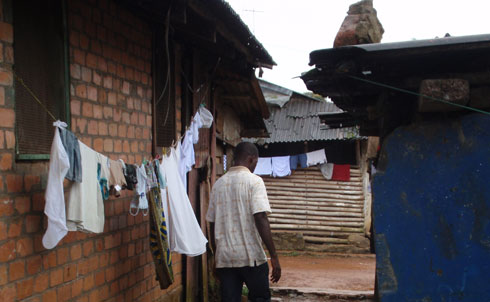
Many of Firestone’s tappers live in the equivalent of shanty towns. The company is building new houses for its work force, but advocates are critical of the new construction. “They said they were building new homes," says Robert Nyahn, of the Save My Future Foundation (SAMFU). "The new homes are just two bedrooms; no latrine, nothing in it."
Credit: Nicholas Jahr
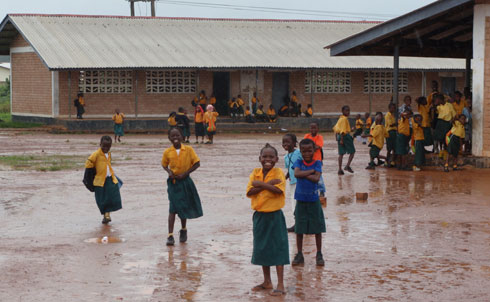
In the company town of Harbel, Firestone also provides schools for the children of its workers. The company continually argues that the social services they provide for their workers more than make up for the low pay. Firestone’s tappers earn $4.26 a day, and the new contract will increase the hourly wages by 3.5 percent, but many are forced to thin their already meager wages by hiring extra help to meet the company’s quotas. "Quite frankly, it’s not really enough," FAWUL’s Austin Natee says. Not only do tappers earn less by hiring extra help out of their own pockets, but those extra hands, not being Firestone employees, are therefore not eligible for any of the social services the company provides.
Credit: Nicholas Jahr
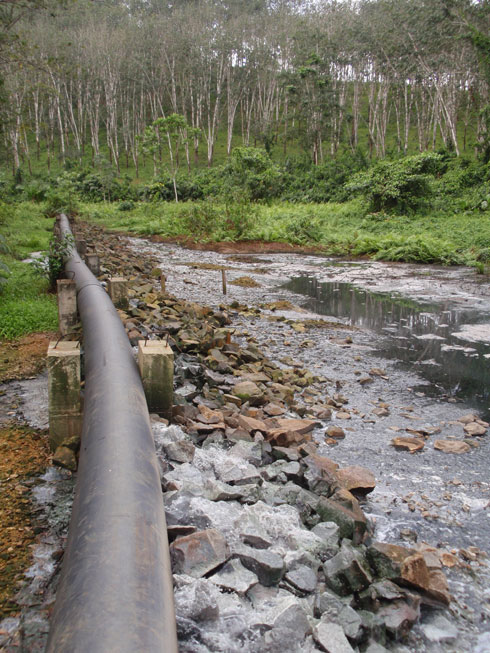
In 2005, people in Owensgrove, a small community inside the plantation, started getting sick. SAMFU accused Firestone of polluting the Farmington River, which local residents used for everything from washing clothes to fishing, from bathing to drinking water. In response, the company began diverting the waste elsewhere, and in the small villages of Brown Town and Kparn Yah, three people allegedly fell ill and died due to the pollution.
Credit: Nicholas Jahr
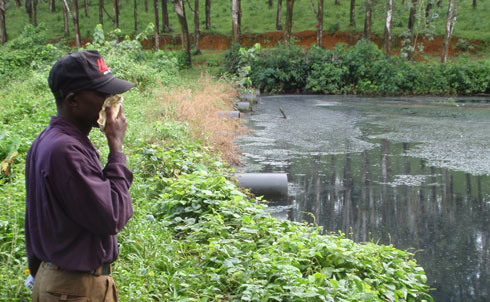
A union member uses a handkerchief to mask the smell. Some days the creek that runs near Brown Town and Kparn Yah is black and still; silver streaks surface in the mud of the road nearby. Pictures can’t capture the stench.
“I’m the third generation born of this plantation,” FAWUL officer Edwin Cisco declares. “My grandparents work[ed] here, my parents work[ed] here, I’m working here. My kids will come and work. So if we cannot secure a better future now for our people, and for our children, what’s going to happen tomorrow?"
Credit: Nicholas Jahr
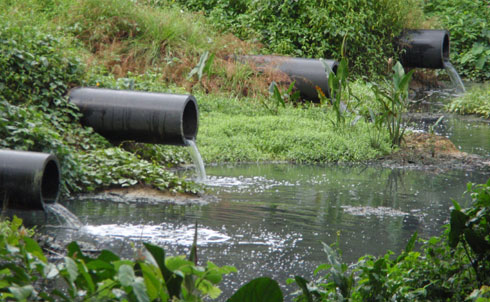
These pipes channel water from one area to another, ultimately leading to the stream which runs past Kparn Yah and Brown Town. In a statement to The Nation, Firestone said that the plantation’s "multimillion-dollar water treatment facility processes water from its factory through equalization and clarification tanks and into constructed wetlands on the company’s property for natural, biological treatment… This type of water treatment is unparalleled in Liberia."
FAWUL’s Nattee is not convinced. "I’m telling you, the water has been polluted," he insists. "It was clean before… but the waste has polluted the whole place."
Credit: Nicholas Jahr
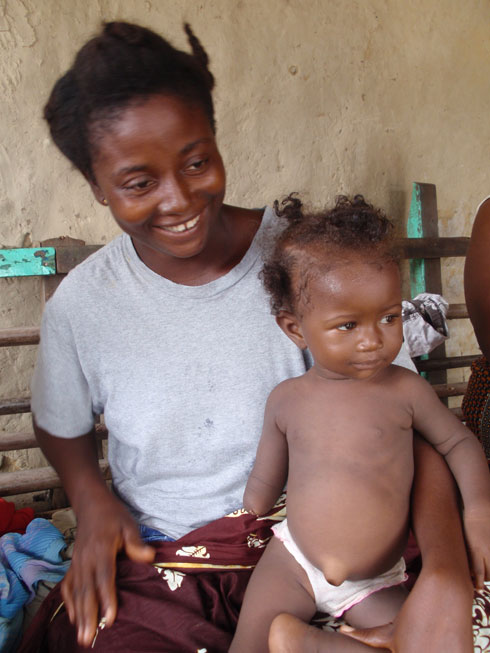
Tenneh Thomas lives in Brown Town, and kept a small garden near the stream. When Tenneh was pregnant with Fatoumata, her fourth child, she had intense pains in her stomach. Doctors asked her if she’d tried to abort her baby. When Fatoumata was born, half her right arm was missing, its fingers little more than stubs. She can’t crawl. She breaks out in sores. Tenneh and the elders of Brown Town believe Firestone’s pollution was the cause. “I need support,” Tenneh says. “To take care of her now is no small thing… They should take responsibility for this child.”
Credit: Nicholas Jahr
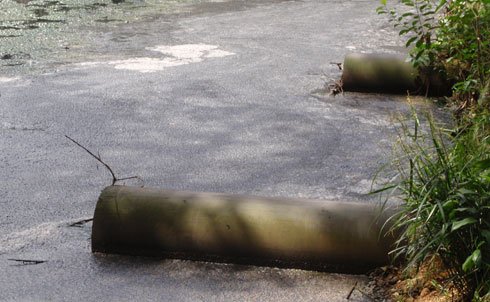
In October of 2009, a government commission found that Firestone had polluted a creek that runs past Brown Town. But the commission only tested for indicators of pollution, not actual toxic pollutants, and Firestone’s own consultants gave the water a clean bill of health. Firestone stands by its claim that it adequately processes all water from its factory, and has therefore declined to take any action to clean up the polluted creek or alter its water treatment process.
Credit: Nicholas Jahr


